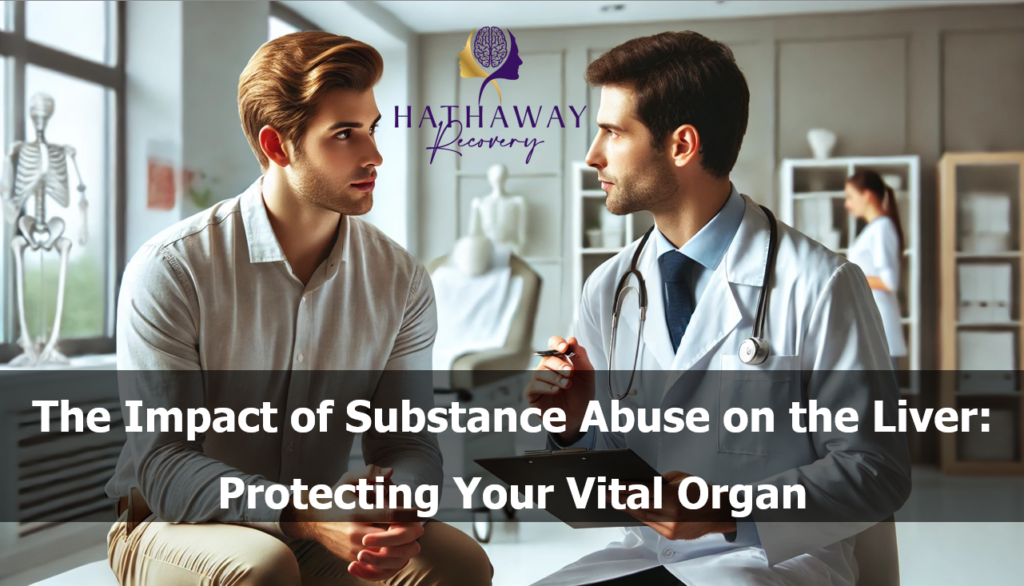
The liver is one of the body’s most essential organs, responsible for detoxifying harmful substances, processing nutrients, and producing bile for digestion. However, prolonged substance abuse, including alcohol, prescription medications, and illicit drugs, can severely damage the liver. Over time, this damage can lead to life-threatening conditions such as cirrhosis, liver failure, and even liver cancer. Understanding the impact of substance abuse on the liver is critical for preventing long-term health complications and seeking help when needed.
How Substance Abuse Affects the Liver
1. Alcohol and Liver Damage
Alcohol is one of the leading causes of liver disease worldwide. When consumed, alcohol is metabolized in the liver, producing toxic byproducts like acetaldehyde that can damage liver cells. Prolonged and excessive alcohol consumption can lead to:
• Fatty Liver Disease: The earliest stage of alcohol-related liver damage, characterized by fat accumulation in the liver cells.
• Alcoholic Hepatitis: A more severe condition involving inflammation and liver cell death.
• Cirrhosis: Irreversible scarring of the liver that disrupts normal function and increases the risk of liver failure and cancer.
2. Prescription and Over-the-Counter Drugs
Many prescription medications, when misused, can harm the liver. Acetaminophen (Tylenol) is particularly notorious for causing liver damage, especially when taken in high doses or combined with alcohol. Other drugs, such as certain antibiotics, statins, and anti-seizure medications, can also lead to hepatotoxicity if not used as directed.
3. Illicit Drugs and Liver Health
Illicit drugs, including heroin, cocaine, and methamphetamines, place immense strain on the liver. These substances can cause:
• Drug-Induced Hepatitis: Inflammation of the liver caused by toxic substances.
• Reduced Blood Flow to the Liver: Resulting in liver cell damage and necrosis.
• Increased Risk of Infections: Intravenous drug use often leads to hepatitis B and C infections, both of which can cause chronic liver disease.
4. Combined Substance Use
Using multiple substances, such as alcohol and drugs, amplifies the damage to the liver. Alcohol can intensify the toxic effects of drugs, increasing the likelihood of liver failure and other complications.
Signs of Liver Damage from Substance Abuse
The liver is remarkably resilient but can only endure so much damage before symptoms appear. Warning signs include:
• Yellowing of the skin and eyes (jaundice)
• Fatigue and weakness
• Swollen abdomen (ascites)
• Nausea and vomiting
• Dark urine and pale stools
• Persistent abdominal pain.
If these symptoms occur, seeking medical attention is crucial to prevent further damage.
Protecting Your Liver
Preventing liver damage involves avoiding or managing substance abuse and adopting healthy habits:
• Limit or eliminate alcohol consumption.
• Follow prescription guidelines and avoid overusing over-the-counter medications.
• Avoid illicit drug use and practice safe injection methods to prevent infections.
• Eat a balanced diet, exercise regularly, and maintain a healthy weight.
• Seek help for substance abuse early to prevent irreversible liver damage.
Help Is Available: Hathaway Recovery
For those struggling with addiction, help is available. Hathaway Recovery offers a lifeline for individuals who want to overcome addiction. Committed to offering a fresh start, Hathaway Recovery extends its support to those in need, focusing on comprehensive care and a personalized approach to treatment.
The Hathaway Recovery Admission Department provides confidential assistance and can be reached at (909) 971-3333. They offer a path to recovery and the opportunity to begin a transformative journey toward a healthier, more fulfilling life.
Take the first step today—your life depends on it.






